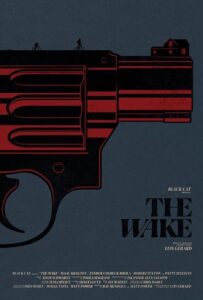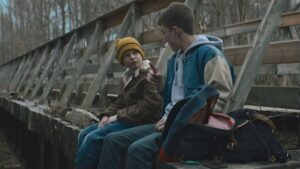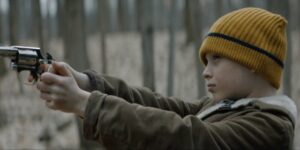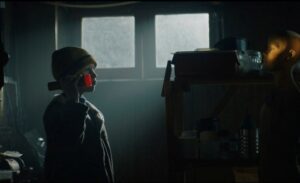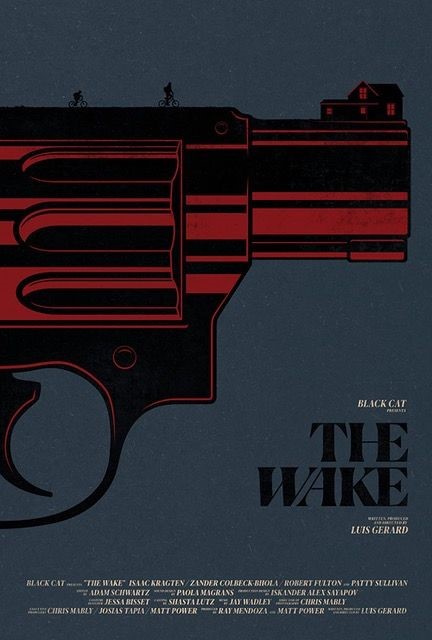
Oscar Qualifying Short Film Review “The Wake”
WATCH THE TRAILER HERE
First, the Recap:
Moments of choice. Each and every day we are faced with a multitude of options and alternatives that will directly impact our lives in whatever capacity they will. The outcomes of these decisions can have either very little or significant implications for us, mainly determined by the make-up of the situations at hand as they are encountered. While we of course wish for said outcomes to be beneficial, what happens when it isn’t such, affecting not only us, but others as well? Walter (Isaac Kragten) remains a rebellious and stubborn teenager, yet his younger brother, Martin (Zander Colbeck-Bhola), who’s deaf, looks up to him and goes along with anything Walter wishes him to be a part of. However, when Walter’s current activities begin to weigh on Martin, it becomes a strained yet cautiously unshakable bond that could truly end up causing both of them more harm than good.
Next, my Mind:
Death, responsibility, family, the depth of brotherhood’s love but sometimes abused connection, and the disturbingly ongoing specter of gun violence all come out in force and with ultimately jarring reality checks through this 23-minute 2023 Oscar qualifying short film from writer/director/producer Luis Gerard, executive producer/cinematographer Christopher Mably (credited as Chris Mably), and executive producer Josias Tapia that grips you from the start and never lets you go thanks to its superbly written story, stark yet perfectly building and striking visual presentation, and a message so wholly pertinent to our contemporary times. Very much like another of these Oscar contenders I reviewed, “Triggered“, this IS a necessary story to tell, maintaining its foundational focus while also offering us an outcome that is just as disquieting and eerie in its end revelation as the aforementioned film above provided. It’s deeply effective, awareness-raising, and influential.
The narrative that sees a teenage boy perpetrating some unsettling endeavors to show his disapproval of authority and being made to feel inadequate by an overbearing father while grasping onto the cherished relationship he nurtures with his deaf younger brother, though whether this ends up for the good of either of them remains to be seen, the pacing of the film suits its tale with keen intensity through both calm and frenetic moments that keep your eyes glued to the screen. The range of thematic paths taken is just diverse enough to gain necessary profundity and insights into the story while not making it feel like it’s TOO involved and wandering to stay cohesive. We clearly see the ventures into stirring but sometimes harsh questions of self-worth, parental expectations and pressures, the need to act out because of them, the ramifications of emotionally compromised decisions, the damage we can do when allowing these inner storms to suck others into them, and the ripple effect of consequences it all can cause, BY our own actions. The previously mentioned dive into gun-related violence and the potential disaster it represents here is paramount, but that’s all I will say. Watch the film to get more into how its place in the story is delivered.
As hinted at above, the film excels in its imagery and how it deftly depicts, especially in the context of the dual and opposite perspectives on the circumstances surrounding them, the two brothers alone because one can hear and the other cannot. This in itself makes the film carry a particular magnitude of heaviness and lightheartedness when seeing how the bothers interact and the influence the one carries over the other, which is visualized wonderfully. By the time this story reaches its utterly mind-jolting, unanticipated, magnificently crafted finale, the manner in which the cinematography has captured all the moments leading up to, out of, and past this is stellar, at least it was for this critic. Also, given the grander, underlying atmosphere that is present through a large portion of the effort, the apropos and haunting music score just adds that additional layer of potency to the proceedings and certainly puts a cap on the ending that just resonates within you well after the film is over. It’s masterful overall production quality that, of course, one should expect from an Oscar qualifier.
Kragten has the honor of opening this film with a quick sequence that assuredly snatches your attention and immediately makes you try to ascertain what precisely has transpired, and he carries this energy throughout the rest of the film via his role as Walter, the eldest of two brothers who is having serious issues with all the stresses of not just BEING a teenager, but from a father who wants him to take on the family business, which he has no interest in pursuing. Finding the means to strike back against this mentality, Walter also ropes in his deaf younger brother who both seems to enjoy the friendship and adventure but starts to have doubts about the real validity and merit their actions have, but still continues to go with it. Whether Walter is more so blinded by how his choices are actually affecting his brother remains a mystery, but soon yields to a startling turn of events. Kragten is absolutely solid and believable.
However, I must share that Colbeck-Bhola in many respects is the true scene stealer here, but not necessarily because of the most obvious facet of the actor’s presence in that he IS deaf in real life. Rather, it’s DUE to this that the degree of emotive, relatable, and committed vigor he infuses into his performance, so pronounced in spite of the disability, is impressive and which might as well NOT be present through his role as Martin, a young boy who we can tell idolizes his older brother Walter. Following along on the “missions” Walter comes up with as a proverbial middle finger to his father and the frustrations directed at him, Martin soon begins to realize more and more that what they’re doing isn’t right, yet he still caves and tries to enjoy certain aspects of their comradery that excite him. But, when one “mission” produces a certain item of interest, it is the start of a chain of events that could spell unforeseen repercussions. It’s such a nuanced, understated, but undeniably powerful performance Colbeck-Bhola provides, a total credit to not allowing anything to get in the way of the art he so evidently loves.
Primary supporting turns arrive first from Robert Fulton as Gary, Walter and Martin’s father who’s dedicated work ethic to their funeral home business is more than evident, but also carries with it the burden of wanting to pass it along to a son who’s not remotely interested in it or seemingly to work hard at all. Patty Sullivan is the boy’s mother Ivy, who of course dotes on her boys as mothers do, and isn’t always thrilled with her husband’s contrary attitudes. Stephen Jackson plays Mr. Robinson, the husband of a recently deceased spouse who ends up becoming a major factor in the boy’s story and the outcomes of rash choices. Additional appearances are made by Kirsten Johnson, Shirley Delang, and Dave Sokolowski among others. So, in total, “The Wake” does very emphatically epitomize the core themes it aims to convey while rendering a striking view of human nature, familial kinship, and not considering the culmination of escalating events and the possible destruction, personal more so in this case, left in the aftermath. It’s both blatant and veiled morality tale that ideally will have the kind of persuasive legacy in people’s minds that it warrants. Whether it’s a legacy of necessary change–that, too, remains to be seen.
STAR RATING (out of 5):
As always, this is all for your consideration and comment. Until next time, thank you for reading!
